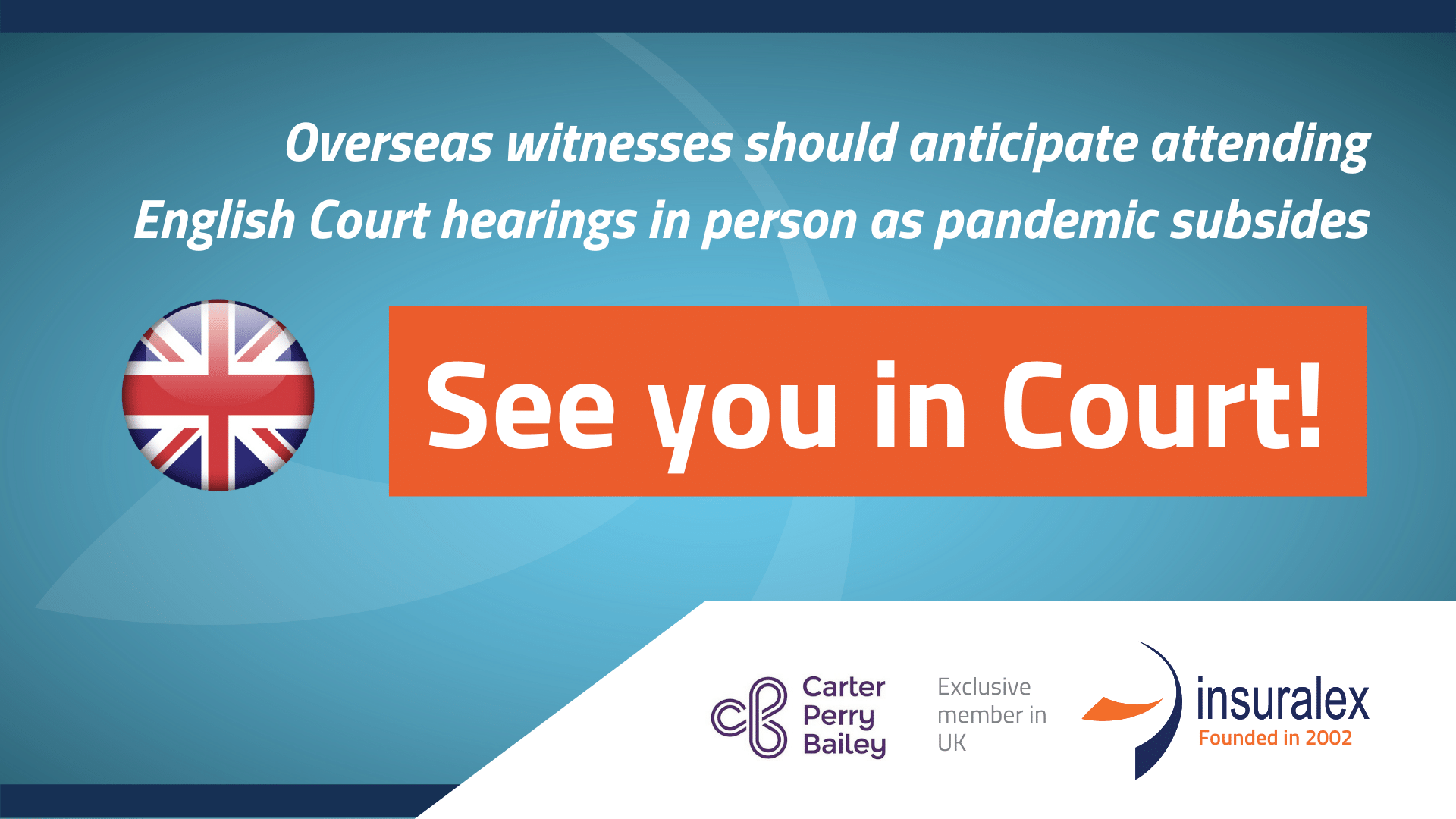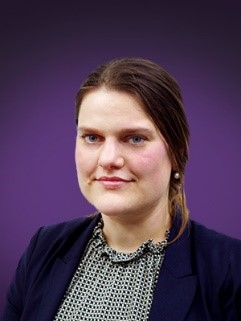
Overseas witnesses should anticipate attending English Court hearings in person as pandemic subsides.
Two recent English High Court decisions provide guidance on the minimum requirements to obtain the Court’s permission for overseas witnesses to provide evidence via video link.
To enable the Courts to continue operating during the pandemic, there was an increased use of video conferencing facilities (‘VCF’) to allow parties to attend remotely. As restrictions have now been eased, the need for VCF should reduce. However, the practical benefits for witnesses, particularly those based overseas, has seen an increase in the requests for use of VCF.
Below, we look at the cases of United Technology Holdings Ltd v Chaffe & Others [2022] 1 EWHC 151 (Comm) (‘United Technology’) and Jackson v Hayes and Jarvis (Travel) Ltd [2022] 1 WLUK 321 (‘Jackson’) which confirm that the default position should now be for witness evidence to be given in person and provide guidance on how and when to apply for permission for VCF to be used.
Overriding Objective
The overriding objective aims for each Court case to be managed by the assigned Judge to ensure efficient justice. Case management Judges have to balance the benefit of witnesses giving evidence in person, compared with the costs, practicalities and potential health risks associated with travelling and being present in the Courtroom itself.
Court Rules and Guidance
The Court may order that a witness be allowed to give evidence via video link or by other means (CPR r32.3), and guidance on the use of VCF is set out in Annex 3 to Practice Direction 32.
While use of VCF can save on time and costs, there are disadvantages of not having the witness physically present in court, when communication can be easier, quicker and clearer, and a fuller presentation of the witness’ demeanour can assist to weigh up the comparative value of their evidence.
United Technology Holdings Ltd v Chaffe (24 January 2022)
This case involved a strike out application. The defendant alleged that the same individual, who it said controlled various offshore entities, was essentially bringing a series of claims using pseudonyms.
The Court had been informed by one person that the hearing of various applications should be heard remotely on the grounds that they were “litigants in person with no officers ordinarily resident in the jurisdiction, and travelling to England is unpredictable and may be impossible for all of the claimants”. However, no evidence was provided to the Court about this, nor were details of where the individuals concerned would be travelling from, although it appears to be inferred that it was from the Marshall Islands.
In the context of the assertion of alleged pseudonyms being used, it was directed by the Judge that the hearing would take place in person and that those witnesses who were to give evidence should bring their passport to verify their identity.
Two general points were made:
– The default position in respect of any hearing, which is due to last longer than half a day, is that it should take place in Court, unless there are good health-related reasons to the contrary (no health-related reason(s) had been identified).
– Pre-pandemic, it was never considered appropriate for hearings to take place remotely simply to suit the ‘convenience’ of one of the parties. This remained the position, and the Court should not direct hearings for the apparent convenience of a party who has chosen to litigate in England but is unwilling to travel here.
Jackson v Hayes and Jarvis (27 January 2022)
The issue of whether an overseas-based witness should be allowed to give evidence remotely arose a few days later in the personal injury case of Jackson.
Ms Jackson had sustained serious personal injuries while on holiday in Kenya and the potential value of the claim was estimated to be over £5 million. The Defendant travel organiser had not admitted liability. The liability trial was due to start in February 2022, but the Defendant had applied for permission for the Kenyan-based hotel manager and expert architect to give evidence via VCF. The grounds for the application included the health risks associated with international travel during the ongoing pandemic and the testing rules on arrival in the UK. The architect was due to give expert evidence on local health and safety standards, which was relevant to whether or not the Defendant was liable.
Agreeing with the decision in United Technology, Judge Eady, in the Jackson case, stated that the default position is for evidence to be given in Court, unless there are good reasons to the contrary. Whilst acknowledging that the ongoing COVID-19 pandemic caused health risks, these were only potential risks. There was no evidence provided that the witnesses would refuse to travel to England nor that they would face unsurmountable difficulties if required to do so. Judge Eady also pointed out that there were practical reasons why it would be beneficial for the witnesses to attend in person. For example, the architect was expected to refer to photographs and plans which would clearly be easier for him and the Court if carried out in person.
Finally, Judge Eady highlighted that no evidence had been provided as to how and where the witnesses were to give evidence abroad, if use of VCF were to be approved, in order to satisfy the Court that sufficient safeguards regarding that evidence had been put in place.
CPB Comment
The English High Court has reiterated that, in lieu of a very good reason to the contrary, the default position is for witness evidence to be given in person.
Any party wanting to deviate from the default position should ensure they provide supporting evidence including reasons for the request itself, together with details of which VCF facilities are proposed to be used. Although health reasons may be sufficient grounds for the bringing of an Application, those will be balanced against the practical benefits of evidence being provided in person.
If a prospective witness would prefer to provide evidence via VCF, they should be warned of the factors that shall be taken into consideration and the importance of providing satisfactory evidence in support.
Local knowledge from an experienced VCF provider is also important. By way of example, in a case in which a request was made to provide evidence by VCF from Islamabad, it was regarded as good practice for a retired local Judge to be present. However, it is the Judge in the Courtroom in England or Wales who shall ultimately decide practical matters such as seating arrangements, who controls the cameras and so on.
Annex 3 of Practice Direction 32 also acknowledges that it should not be presumed that all foreign governments are willing to allow their nationals or others within their jurisdiction to be examined as a witness before a Court in England or Wales by means of VCF. If there is any doubt, enquiries can be made with the Foreign, Commonwealth & Development Office (‘FCDO’) to ensure that the country does not object. As a word of warning, in the recent case of ASR Interiors Ltd v AWS Trading Ltd & Anor [2022] EWHC 372 (IPEC), the judgment of Recorder Douglas Campbell QC observed that “at a bare minimum, when the time comes for the video link to be activated the witness should be in a room with all the case papers before him or her and with no distractions.” In that case (a matter involving evidence from UK-based witnesses), a party successfully applied for one of its witnesses to give evidence via VCF. Upon being contacted, the witness initially sought to give evidence via a mobile phone whilst driving and then from a busy office. Having located a quiet spot in a store cupboard, the witness was then found not to have his own statement nor exhibit available. No weight was attached to the testimony he was able to deliver!
March 2022
If you have any questions regarding the issues highlighted in this article, please get in touch with Helen and Lisbeth. You can review a range of articles on similar insurance and reinsurance related topics in the Publications section of our website. If you did not receive this article by email directly from us and would like to appear on our mailing list please email tracy.bailey@cpblaw.com
 Helen Tilley
Helen Tilley
Partner
T: 0203 697 1910
M: 00771 773 3865
E: helen.tilley@cpblaw.com

Lisbeth Poulsen
European Qualified Lawyer
T: 0203 697 1905
M: 07832 467563
E: lisbeth.poulsen@cpblaw.com
This information has been prepared by Carter Perry Bailey LLP as a general guide only and does not constitute advice on any s pecific matter. We recommend that you seek professional advice before taking action. No liability can be accepted by us for any action taken or not as a result of this information, Carter Perry Bailey LLP is a limited liability partnership registered in England and Wales, registered number OC344698 and is authorised and regulated by the Solicitors Regulation Authority. A list of members is available for inspection at the registered office 10 Lloyd’s Avenue, London, EC3N 3AJ.



